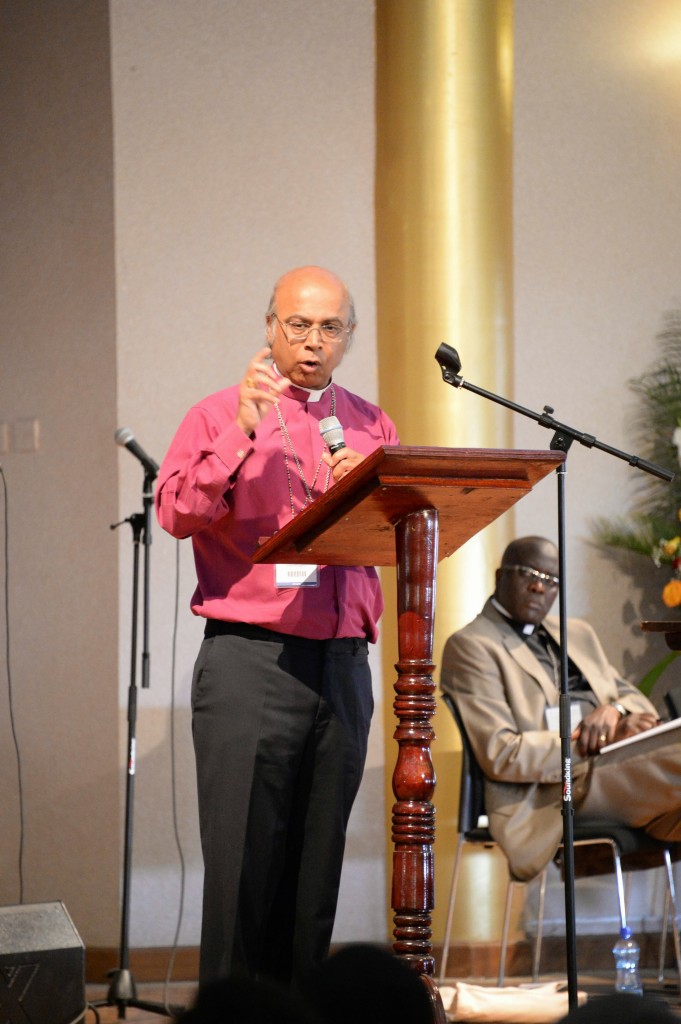On April 30th, the John Jay Institute hosted the Right Rev. Dr. Michael Nazir-Ali, former bishop of Rochester and current director of the Oxford Centre for Training, Research, Advocacy and Dialogue. The event, entitled “Taking Religion Seriously: Muslims, Christians, Jews, and World Order,” attracted attendees from the greater Philadelphia area, especially the surrounding Main Line. The lecture dealt with such issues as secularism, philosophies of religious dialogue and coexistence, and the interaction of Abrahamic faiths.
Bishop Nazir-Ali criticized secularism for its insufficiency. He asserted that there is “a personal dimension to the spiritual. We can’t understand people and their beliefs without understanding this.” People are deeply moved by their religious convictions (“but what we make of them, we shall see”). Bishop Nazir-Ali pointed out that the very term religio means “to bind together.” Religion, according to the Anglican clergyman, is “the glue that has stuck society together…All moral codes have arisen in religious systems.”
Of course, secularism is the exception to the rule. The liberal West in particular has tried to replace religion with democracy and the welfare state. Democracy now legitimizes what religion used to while the welfare state provides what churches used to. However, the two institutions of welfare and democracy cannot provide everything. Quoting a friend, Nazir-Ali wryly observed, “You can provide Prozac for people, but not meaning.” To put it another way, the two ersatz institutions meant to replace religion cannot provide the spiritual principles that offer true moral guidance or the transcendent vision necessary for human happiness, wholeness, and sense of purpose.
Despite its offerings of meaning and morality, “religion can and does go wrong. And when it does, it can and will cause conflict.” However, the bishop noted that nearly all institutions go wrong, including human love and patriotism. “The really great conflicts of the twentieth century were not religions,” Bishop Nazir-Ali contended. Instead, the jaw-dropping cruelties of the last century tended to arise from secularist impulses or (in the case of some in Nazi Germany) Teutonic neo-paganism. Either way, at least religion is held accountable for its actions today in the court of public opinion and in inter-religious dialogue.
“But I’m not a fan of kissy-kissy dialogue,” Bishop Nazir-Ali warned. In his later comments regarding dialogue between Christians and Muslims, he upheld the prime importance of “reciprocity”: the ability to work out honest compromises that do not become a mere exercise of tit-for-tat. This is made all the more difficult by the dhimma, a longstanding Islamic feature which makes non-Muslims into second-class citizens. Among other difficult principles, the dhimma enforces a controversial inequality of women, separates non-Muslims out from the business of government, and demands a restoration of lands lost to Islam (this aspect has certainly aggravated already strained Israel-Palestine relations).
Bishop Nazir-Ali mentioned several other important stress points for current engagement. Policymakers need to work out the relationship of religion to the state—“not if religion has a role, but what that role is.” The clergyman also highlighted the relationship of religion to democracy, since, in an Islamic context, this has often led to a tyranny of the majority. Judicial thinkers need to work out the sources of law—will there only be Sharia, no Sharia, or will Sharia be one among other law sources? Religious activists are to be warned of “unreconstructed seventh century material being deemed suitable for the twenty-first century.” Finally, Muslims and Christians need to wrestle with justifiability of conflict. While there is a question of jihad that needs settling, Nazir-Ali thought that just war can be employed in non-conventional conflict. Nevertheless, it would be ideal for Muslims and Christians to come to an agreement.
Most of the lecture was spent in a sweeping history of Abrahamic religions and their interactions with each other. As Bishop Nazir-Ali himself noted, “There has never been a time…when Muslims, Christian, and Jews have not been living together.” The church leader offered tremendous insight by discussing the Islamic conquest of the Middle East and North Africa, the “Golden Age” of learning (which relied on the contributions of conquered Christian and Jewish scholars), the Crusades, the arrival of the Mongols, the rise of the Ottoman Empire, and the initiation of Zionism. It became quite clear that history is a key to understanding both the present context of Abrahamic faiths and the limited possibilities for future resolutions.
All of these historical pivot points should inform scholars, religious leaders, and statesman in their inter-religious work and policy in foreign situations. Unfortunately, various groups—secular and religious—generally retreat to their intellectual ghettos and declare ham-handed policies without sufficient knowledge or skill. No doubt the world would be better served if men approached such important subjects with Bishop Nazir-Ali’s care, or if they at least heeded the good churchman’s counsel.





Comment by Byrom on May 12, 2014 at 7:34 pm
Islam is not compatible with either Christianity or a constitutional republic like the United States. We need to stop pretending that Islam can be.